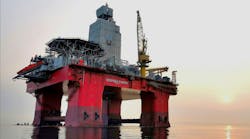Despite the looming threat of a gas supply crisis this winter, government officials are doing little to expedite exploration and development of new coalbed methane (CBM) deposits in Wyoming's Powder River Basin, one of the hottest onshore gas plays in the US.
Paul M. Rady, chairman and CEO of Pennaco Energy Inc., said Thursday he sees little chance that government officials will accelerate environmental impact study of potential CBM drilling on federal lands in that basin.
"The general tendency is to delay such studies. This one originally was to have been completed last year," Rady said at the final session of an annual energy conference sponsored by Dain Rauscher Wessels Inc. in Houston.
The federal government owns 45% of the mineral rights in the Powder River Basin, with Wyoming and private landowners holding the rest.
Rady said time-consuming federal regulatory procedures�including the slow-moving environmental impact study�has delayed development of the deeper Big George coal deposit that dominates the west central section of that basin.
The Big George deposit is adjacent to the prolific Wyodak coal deposit along the eastern edge of the basin near Gillette. Most of the thousands of CBM wells drilled in that basin have been primarily in association with Wyodak coal.
He said that's why Wyoming is the only state that registered an increase in gas production, while the two major domestic gas producers�Texas and the Gulf of Mexico�are in decline (OGJ Online, Sept. 21, 2000).
BOPs
Moreover, Wyoming regulators are considering requiring blowout preventers on the lightweight truck-mounted rigs that drill the shallow CBM wells. "That would add $5,000 to the current cost of $30,000-60,000/well," said Rady.
That added cost would not be prohibitive in the lucrative CBM market. On an 80-acre spacing, the typical Powder River 800-ft CBM well has a finding/development cost of 24�/Mcf and delivers a cash margin of $1.32 at a market price of $3/Mcf.
But it would drastically slow the current fast drilling pace of 10-20 wells/week.
Regulators began looking at the possible need for blowout preventers after a worker smoking near a drilling site was burned by escaping gas as a CBM well was being completed. Such wells are low pressured, but gas can escape in the final "washing out" procedure as workers clean up the well bore.
That problem could be addressed simply by enforcing well-site safety procedures, with perhaps having heavier drilling fluids on hand for an additional safety factor, said Rady. "With nearly 7,000 wells drilled, I've only heard of three accidents," he said.
Potential
Rady said there are 60-70 rigs working in the Powder River Basin where more than 2,300 CBM wells are producing in excess of 30 MMcfd of gas. More than 3 million acres in that area are prospective for CBM, with as much as 16 tcf of gas estimated to be recoverable.
Pennaco alone has a 4-year inventory of more than 2,000 prospects to drill in that basin. Rady said 69% of the company's acreage has not yet been evaluated for reserve potential.
At that same session, Evergreen Resources Inc. officials said they acquired interests in some 24,000 acres of producing coalbed methane properties in the Raton Basin from KLT Gas Inc., a subsidiary of Kansas City Power & Light Co., in a combined stock and cash deal valued at $176 million.
Those properties, estimated to contain 153 bcf of proved gas reserves, are located on the Colorado side of the Raton Basin where Evergreen is already the largest leaseholder and the most active operator. The properties currently produce about 28 MMcfd of gas from 151 net wells.
That acquisition will give Evergreen Resources 88% of total gas sales from the Raton Basin, up from 55% previously, company officials said. The firm currently produces 47 MMcfd from 303 net wells in that area.
All of the reserves attributed to the acquisition are assigned to the Vermejo coal deposits, with 87% of those reserves classified as proved developed producing, 4% as proved developed non-producing, and the remaining 9%, proved undeveloped. Officials said additional unproved potential in shallower Raton coal deposits and in deeper formations.
Evergreen is paying $70 million cash, plus $100 million in mandatory redeemable preferred stock and $6 million in common stock for those properties. However, 20% of the proposed acquisition is subject to a preferential right to purchase, officials said.
Evergreen Pres. and CEO Mark S. Sexton said the acquisition is "a perfect fit" to the company's existing operations and will be immediately accretive to per-share production, cash flow and earnings.
Evergreen Resources has accelerated its drilling program and plans to do more than 100 wells annually through 2001, including evaluation and development of the shallower Raton formation. Since 1993, the Denver-based independent has drilled more than 300 CBM wells with a 98% success rate.
It currently is using that expertise to develop CBM and mine gas production in six onshore exploration areas totaling 500,000 square acres in the UK.
